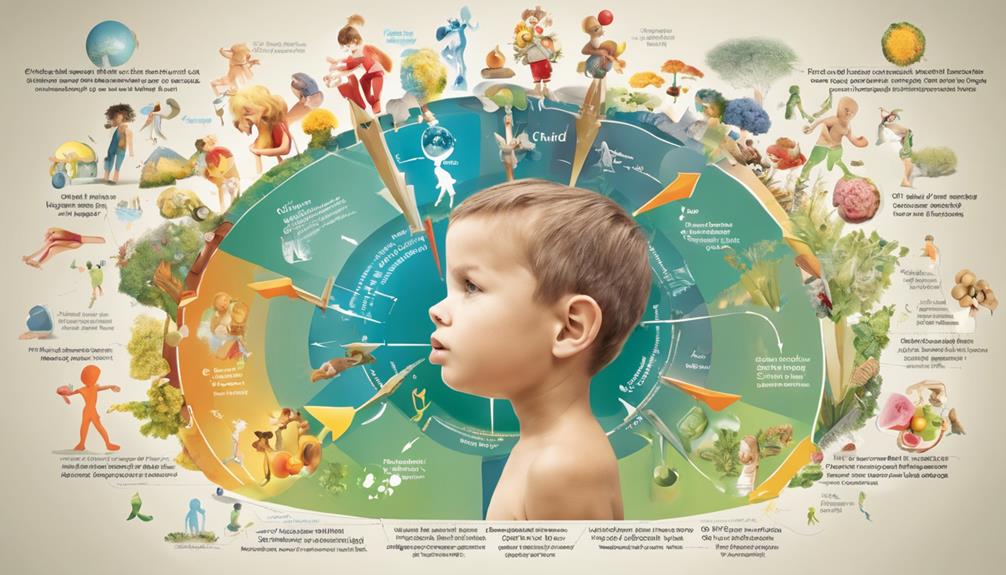As we delve into the complexities of child development, we discover a diverse tapestry of influences that shape their journey of growth.
The interplay between genetics, nutrition, environment, and healthcare forms the foundation upon which children's progress is built.
By unraveling these layers, we gain clarity on the intricate dance that shapes their future selves.
Join us as we navigate through the intricate web of factors that determine child growth, shedding light on the roadmap to nurturing healthy development in our young ones.
Key Takeaways
- Genetics, nutrition, environment, and healthcare practices intersect to influence child growth.
- Parenting styles interact with genetic predispositions to shape a child's development.
- Nutritional factors like protein, iron, calcium, and zinc are essential for optimal growth.
- Positive social environments and access to healthcare support healthy child development.
Genetics and Child Growth
In understanding child growth, genetics plays a pivotal role, influencing approximately 80% of an individual's eventual height. Genes are the blueprint that guides the development of a child from infancy to adulthood. Genetic disorders, such as Down syndrome and spina bifida, can have profound effects on child growth and development, impacting not only physical but also cognitive aspects.
It's fascinating to note how genetic influences extend beyond physical attributes. For instance, childhood intelligence and cognitive processes are intricately linked to genetic factors. Parenting styles further interact with these genetic predispositions, shaping a child's behavior and overall development. This interplay between genes and environment highlights the complexity of child growth.
Each child's genetic makeup contributes to their uniqueness, influencing how they grow physically, intellectually, and emotionally. Understanding these genetic underpinnings is essential in tailoring effective strategies to support ideal growth and development in children.
Nutritional Factors Impacting Growth

Nutritional factors greatly impact the growth and development of children. Protein plays a vital role in muscle development, tissue repair, and enzyme production. Adequate protein intake is essential for achieving developmental milestones as it provides the building blocks necessary for growth.
Conversely, iron deficiency can hinder a child's growth, leading to impairments in cognitive development and immune function. Calcium is vital for bone growth in children, ensuring the formation of strong and healthy bones. Vitamin D complements this process by facilitating calcium absorption and bone mineralization, supporting proper bone growth.
Additionally, zinc is necessary for the growth and development of children, aiding in immune function, wound healing, and DNA synthesis. Understanding the impact of these nutritional factors on a child's growth is crucial for promoting optimal development and overall well-being.
Environmental Influences on Growth

Examining the impact of external factors on child growth reveals a complex interplay between environmental influences and developmental outcomes. Environmental factors such as pollution can affect a child's development, potentially impacting neurodevelopment and academic performance.
Climate variations also play a role, influencing physical growth patterns in children. Access to a balanced diet and clean water is essential for best growth, providing the necessary nutrients for a child's development.
Moreover, peer relationships and social interactions are significant environmental factors that shape a child's growth trajectory, emphasizing the importance of positive social environments.
On the contrary, exposure to harmful substances like lead or pesticides can hinder healthy growth and development in children, underscoring the need for a safe and toxin-free environment to promote best growth outcomes.
Healthcare Practices and Child Development

Regular pediatric check-ups and screenings play an important role in monitoring the physical, cognitive, and emotional development of children. Healthcare providers use these visits to assess growth patterns, developmental milestones, and overall well-being.
Early intervention is key in addressing any developmental delays promptly, guaranteeing children receive the necessary support for healthy growth and development. Healthcare practices such as vaccinations, nutrition counseling, and growth tracking are essential components in promoting ideal physical and cognitive growth.
Through access to healthcare resources like vision and hearing screenings, potential issues affecting child development can be identified and addressed early on. Collaborating with parents and educators, healthcare providers can create a total approach to supporting children in reaching their full potential.
Supporting Healthy Growth in Children

To support healthy growth in children, implementing positive parenting practices is essential for establishing effective diet regulation and weight management. Parents play an important role in shaping their child's development, influencing both physical growth and social development during Early Childhood. By adopting authoritative parenting styles, parents can promote confidence and independence in their children, laying the foundation for healthy growth.
Early intervention by counselors can also help children meet important developmental milestones and address any challenges they may face. Counselors play an essential role in providing behavioral treatments for conditions like ADHD, supporting children's mental and social development. Additionally, family counseling can assist parents in supporting their children's development and effectively managing any mental health conditions that may arise.
Through a combination of positive parenting practices and professional support, parents can help children thrive and reach their full potential in all aspects of growth and development.
Frequently Asked Questions
What Determines the Growth of a Child?
We are influenced by genetic factors, environment, and parenting styles. Growth indicators like height, weight gain, and cognitive milestones track child development. Counselors provide early intervention. It's the interplay of these factors that shapes a child's growth.
How Is Child Development Determined?
In child development, genetics and environment interact to shape growth. Genes influence traits like intelligence and physical features, while nutrition, parenting, and social environment also play key roles. Understanding this interplay is crucial for healthy development.
Why Is It Important to Understand How Children Grow and Develop?
Understanding how children grow and develop is crucial for early issue detection, promoting healthy development, and tailoring support. It aids in tracking progress and addressing concerns promptly, empowering caregivers to optimize children's well-being.
What Are the 5 Stages of Child Growth and Development?
Child growth is comprehended through five stages: infancy, early childhood, middle childhood, adolescence, and adulthood. Each stage brings unique physical, cognitive, and social milestones. These stages shape a child's growth journey from infancy to adulthood.
How Does Understanding Standard Measurements in Child Development Help Determine Child Growth?
Understanding standard measurements in child development is crucial in determining a child’s growth progress. These measurements provide a clear benchmark for assessing physical, cognitive, and emotional development. By comparing a child’s measurements to established standards, parents and caregivers can identify potential growth issues early on and seek appropriate interventions.
Conclusion
In understanding what determines child growth, we navigate a complex landscape akin to a vibrant garden. Just as genetics sow the seeds of potential, nutrition provides nourishment for growth. Environmental influences act as the sunlight and water, shaping development.
Healthcare practices serve as the vigilant gardener, ensuring top conditions for growth. By fostering a balanced ecosystem of support, we can cultivate healthy growth in children, allowing them to flourish and bloom to their full potential.









